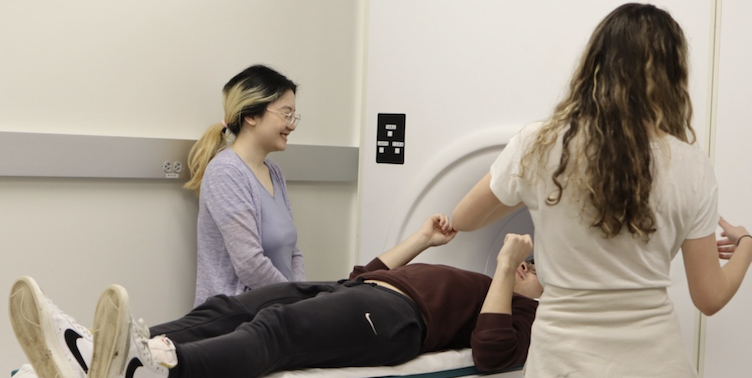A quest to demystify human behavior

It was the middle of summer, and Eric Ingram ’21 decided to trade his bathing suit and sandals for brain scanning technology. He was on a mission to collect data for an ongoing study that explores human learning under conditions of uncertainty.
“We are looking at how learning differs between social and nonsocial contexts,” says Ingram, a psychology student who has been working with Oriel FeldmanHall, an award-winning social neuroscientist and assistant professor affiliated with Brown University’s Robert J. and Nancy D. Carney Institute for Brain Science.
Using an fMRI scanner—functional magnetic resonance imaging that measures brain activity by detecting changes associated with blood flow—Ingram is looking at where learning occurs in the brain. He is tracking the decisions of study volunteers in a social context (for example, when they choose to give money to a partner) and in a nonsocial context (like when they decide to use a mechanical slot machine). The goal, he says, is to determine whether participants adapt to uncertainty faster in a game involving a human or a machine.
“What makes our project unique is the functional aspect of it,” Ingram says, adding that “we are looking for targeted brain regions that may be linked to differences in learning success.”
Ingram and FeldmanHall are interested in knowing if higher levels of anxiety produce particular results within social and nonsocial situations. That's why they also measure anxiety levels in all study participants, which could potentially reveal insights into anxiety disorders.
“Social learning is something all people do on a daily basis without even thinking about it,” Ingram says. “We may be able to examine a particular area of the brain or brain function that is inhibited by General Anxiety Disorder.”
An unparalleled undergraduate experience
Ingram is one of 52 students who received summer Undergraduate Teaching and Research Awards (UTRAs) on brain-related projects—approximately 25 percent of all UTRAs in the sciences this year. The awards provide financial support for students collaborating with faculty on research and teaching projects.
Ingram’s research experience was supported by an endowed UTRA established by Tom Pincince '86, P’17 and his wife, Jennifer. For Tom Pincince, the idea of being able to unpack human behavior is both fascinating and compelling: "What's interesting about Eric's work is the idea that scientists will uncover the relationship between the way we behave and the internal structures of the brain.” Ingram is the tenth student to be supported by the Pincince’s UTRA fund since it was established in 2008.
As an undergraduate at Brown, Pincince was the recipient of a similar award that allowed him to work in the lab of neuroscience professor John Donoghue, founding director of the Brown Institute for Brain Science—now the Carney Institute. The award, Pincince says, gave him the time and room to experience neuroscience live.
"UTRAs provide an opportunity that can inform the decision process of a young person,” Pincince said. “I hope that my UTRA, and others, will continue to foster that freedom and space for students to ask, 'is this something I want to do?'"
Full focus
Thanks to his transformational summer experience, Ingram has decided to pursue a Ph.D. in clinical psychology with a specialty in neuropsychology after graduation. He will explore topics for his honors thesis this fall.
“The UTRA has helped me gain real, applicable research skills, and it allowed me to focus full time on this project in the summer,” says Ingram, who is also a member of the Brown Men's Track and Field team. “Because I am able to do research during the summer instead of during the academic year, my time is not limited by classes, track practice, or traveling for competitions.”



